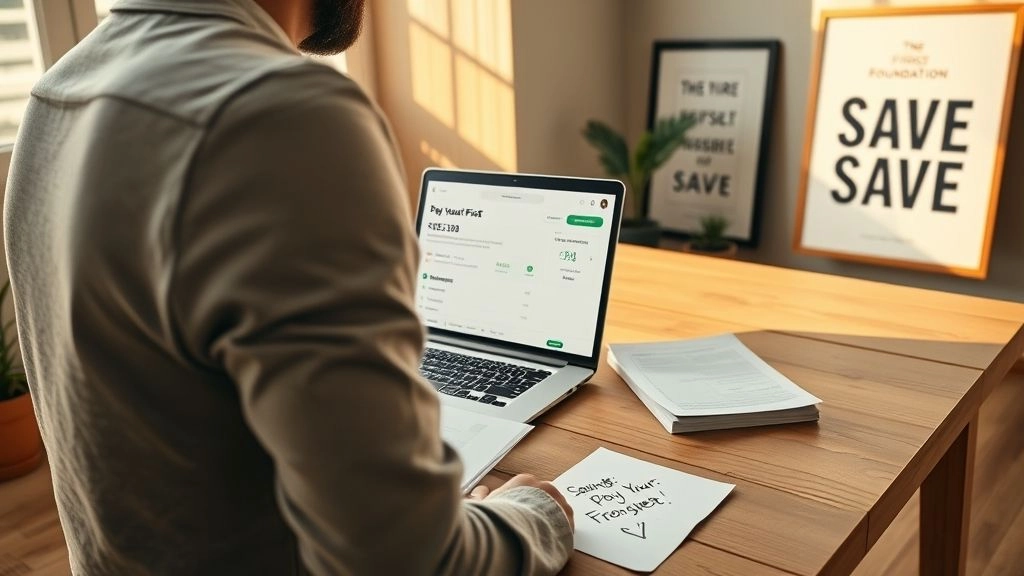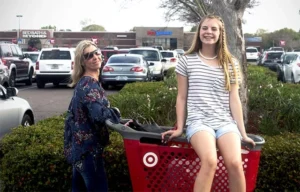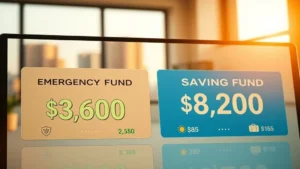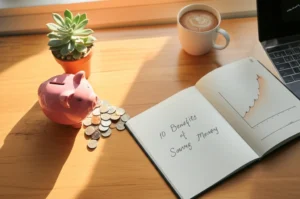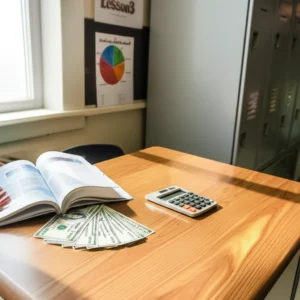Why Pay Yourself First?
What if I told you there’s a way to save that doesn’t feel like a chore… because, honestly, who has the willpower to say no to that extra iced coffee every single time? Think about it: you get your paycheck, and—poof!—before you’ve even blinked, most of it is gone to bills, groceries, and a whole lot of random “stuff” you barely remember buying.
That’s where this little idea totally changed the game for me (and maybe for you, too): A great principal for saving money is, Start paying yourself and dave ramsey. Instead of crossing your fingers that something’s left over at the end of the month, what if you flipped things around and paid yourself first?
This isn’t some complicated system—just a simple shift. You treat yourself like one of your “bills.” Only, instead of dreading this bill, you’ll love it. Trust me. Even Dave ramsey says this is the core of feeling good about your cash flow (and he’s not wrong!).
The ‘Reverse’ Budget Trick
Ever Wondered Where the Money Goes?
Here’s a confession: for years, I had no clue where my money went. I could have sworn there was some black hole in my bank account. Maybe you know the feeling? One of my buddies actually started a “spending diary” for a week—every cent, written down. Turns out, $200 had snuck out just for takeout and coffee. What?!
This is what happens when you follow the traditional approach: get paid, spend on what feels urgent, then try to save whatever, if anything, is left. Spoiler: almost nothing is left. That’s why the concept from A great principal for saving money is, Start paying yourself and dave ramsey works so well. You send cash to savings first… and only then do you handle bills and spending. It’s called “pay yourself first,” sometimes known as “reverse budgeting” research on spending habits.
Dave’s Take, in Plain English
Dave Ramsey and his whole crew are super big on this. You might’ve seen it demoed in Dave ramsey Chapter 3, LESSON 1—it’s about putting yourself first, so your future isn’t an afterthought. He calls it “giving yourself the first fruits.” (Honestly, it feels kinda official, like you’ve become the CEO of your own bank account.) If you need a little push or want to see where you stand with these concepts, hop over and take the Ramsey classroom chapter 3 post test… it’ll tell you if you’re on the right track or just faking it. No shame—been there.
Before vs. After: “Pay Yourself First” in Action
| Before (Old Way) | After (Pay Yourself First) | |
|---|---|---|
| Paycheck Arrives | Bills, spending, maybe save…? | Automatic transfer to savings first |
| Feelings Mid-Month | Stressed, broke, no buffer | Peace of mind, guilt-free spending |
| End of Month | Oops, where’d my money go? | Look! Real savings, almost by accident |
I can’t tell you how good it feels to open my banking app and see that sneaky “rainy day” fund growing… it’s weirdly addictive (in a good way).
Debt, Savings, and Real Life
Debt: Which Bite First?
I’d be lying if I pretended savings were all sunshine and unicorns. If you’re carrying a bunch of debt, you’re probably thinking: Do I really save first, or crush that debt? Dave Ramsey dives deep into this dilemma. (He even has a whole section in Baby Step 2.)
The gist? Ramsey says—pause investing and any fancy savings goals until you knock out that debt mountain. Hit pause on buying stocks; start demolishing those credit cards. Why? Because—get this—every dollar that goes towards interest is a dollar that isn’t buying you freedom (explanation on snowball vs avalanche methods).
Not everyone agrees with Ramsey on this, but…it works because you get small wins fast. Sometimes, momentum matters more than perfect math. More than one friend paid off a card, felt that rush of “I did it!,” and suddenly, budgeting didn’t feel so scary anymore.
First Foundation: Save Your Skin
I can’t skate by without mentioning the first steps—like “the first foundation is: save.” Before you think about investing or splurging, you need an emergency fund. (Ask anyone who’s had a flat tire, a busted pipe, or…well, a surprise vet bill.)
Check yourself with that Ramsey classroom chapter 3 post test if you’re curious about where your foundations stand. Honestly, the quiz isn’t about passing or failing; it’s about seeing where your blind spots are, and learning to patch them up before they’re a problem.
Late Payments: Small Mistakes, Big Ripples
Here’s a story… a buddy missed a card payment last year, “just this one time.” Spoiler: his lender dinged him fast. Suddenly, an $18 lunch cost him a $35 late fee, and his credit score dipped for months. If you want a vivid reminder, check out if you make a late credit payment, you might see the lender add for a quick reality check. Such tiny mistakes can undo a ton of careful saving…
Budgeting With Less Stress
What’s Your Money Story?
Do you ever sit down with your pile of bills, squint at your online bank, and wonder, “Where is it all going?” If that’s you (it was me for years), take a breath. Real budgeting is not about nitpicking every nickel or feeling guilty for spending. It’s just a plan—a way to say “yes” to today, while making sure tomorrow’s self will thank you.
This is why Dave’s approach feels more human. Instead of a perfect spreadsheet with endless categories, you start with simple steps. Pay yourself first. Tackle the loudest debt. Build your buffer (that “first foundation”). It’s like learning to walk before you try for a marathon.
The Mystery of the Fourth Foundation
People always ask in money forums: what is the fourth foundation of the dave ramsey course? I’ll spoil it—the fourth foundation is giving. But you can’t pour from an empty cup, right? Giving comes when you’re stable; you start with saving, build up, get out of debt, and then your generosity flows naturally.
Quick Frugal Wins Table
| Swap This | For This | Money Saved |
|---|---|---|
| Coffee Shop Latte | Home-brew & mug | $4/day |
| Order-In Dinners, 2x/week | Simple home meals | $30/week |
| Streaming Service #4 | Just 1-2 faves | $10/month |
| Random Amazon buys | Wishlist pause, 48 hours | Impulse costs |
| “Money left over” saving | Automatic transfer at payday | Snowballs, month after month |
Don’t think of these as punishment. Think of them as swaps you control… and maybe even enjoy. Saving doesn’t have to feel like “missing out.” It’s about freedom—the freedom to say yes when you want to, and no when you need to.
Beyond Basics: Saving for Bigger Things
Can You Save for Big Dreams?
Let me guess: saving is all well and good, but what about the big stuff? Down payments. That dream vacation. Or, heck, Christmas gifts that don’t nuke your January. I’m not saying you cutting out every fun thing in your life! In fact, the whole reason for paying yourself first is so you can do both—save, and live a little.
For me, setting up that automatic transfer the day my paycheck landed felt like “hiding” money from myself. And turns out—I didn’t really miss it. (That’s what research on spending habits calls “frictionless savings,” but I just call it outsmarting my future self.) Every couple months, I move a little more, a little earlier. The snowball gets rolling… in the right direction this time.
Dave’s Steps, Your Way
You’ve probably heard of Dave’s “baby steps.” Yeah, seven is a lot, but don’t get overwhelmed—just start with step one. If you’re wondering how all this fits your real life, take pieces of it that stick: pay yourself first, zap your bad debts, build your emergency fund. Even small wins matter.
Everyone’s cash flow looks a bit messy up close. Dave’s path works because it’s so human—it expects you’ll trip up sometimes. That’s why trying out tools like the Ramsey classroom chapter 3 post test or scrolling through Dave ramsey Chapter 3, LESSON 1 can show you there’s always time for a reset.
Side-by-Side: Ramsey vs. Yours
| Dave Ramsey | Your Way (Pay Yourself First Twist) | |
|---|---|---|
| 1: Budgeting | Zero-based budget, strict tracking | Automatic savings, then spend from what’s left |
| 2: Debt Payoff | Smallest to biggest (“snowball”) | Prioritize high interest if you want |
| 3: Emergency Fund | 3-6 months, ASAP | Even $25/week counts (just start!) |
| 4: Giving | Only after debt-free and secure | Give small, if you can, but stability first |
See? It’s flexible—nobody’s here to judge if your version is a bit messy, like mine. What counts is progress, not perfection. Even Dave himself would agree with that.
Wrapping Up: Make Saving Personal
So, if I could offer one piece of advice to my past self (or to you, right now), it’d be this: a great principal for saving money is, Start paying yourself and dave ramsey. You absolutely don’t have to get everything right, right away. Start with that first transfer—even five bucks!—before the mortgage company, the coffee shop, or the streaming apps get their cut. Build up those wins, take the Ramsey classroom chapter 3 post test to see how you’re doing, and tweak as you go.
Remember, the first foundation is: save. Test ideas from Dave ramsey Chapter 3, LESSON 1. Avoid those nasty surprises—no one wants to see what happens if you make a late credit payment, you might see the lender add fees or headaches. (And if you’re still wondering what the next step looks like, peek at what is the fourth foundation of the dave ramsey course?—but only once you’ve got saving rolling.)
You don’t have to wait for a new year, a new month, or even a Monday. Just start. You’ll thank yourself—and so will your stress levels. I’m rooting for you. If you want to share your first “pay yourself” moment or swap wins and fails, drop them below. We’re all learning. Ready to put yourself first… at least for your money’s sake?

